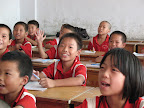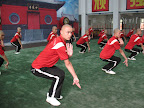Most of the students at Little Dragon enroll when they were 4-5 yrs. old but some look barely old enough to be out of diapers. The average student receives their entire compulsory education at Little Dragon. That means they will be 17yrs old when they leave. The school environment is not exactly kid-friendly; stale dorms, harsh instructors, and the sanitary level of the cafeteria can only be described as sketchy. They sleep in rooms with 4-20 other students on beds that make concrete feel comfortable. The only color on the white plaster walls is that of old stains. Their days consists of rigorous training and classroom instruction. Yet they somehow still find ways to enjoy being children (see photo below).
 |
| From Harvey's photos #dsac09 |
Kindergarterners enjoy a break with DSA students.
Holidays come about once every 5 months when the students are allowed to return home for a week or so. Parents can come and visit anytime but most live so far away they make the trek a few times a year. Those who can afford to give up their home roots move to Shaolin so they can visit once a week or more.
 |
| From Harvey's photos #dsac09 |
No longer kindergartners, but on the same concrete and wearing the same suits, older students practice morning drills.
As an upcoming parent (my first baby will be due 3 weeks after I return from China) I couldn't help but wonder about the estrangement from parents that must occur here. Don't these kids miss their parents? How can parents accept such a limited relationship with their own children? How can they drop them off at 4 and get them back at 17? At first, I want to dismiss it as irresponsible or unloving parenting, but doing so would fail to understand the cultural, social and economic demands that drive families to this decision.
I can understand the objective. For most students, attending a school like Little Dragon provides a secure future. Jobs in military, police, and security. What parent doesn't worry about their child's future. Will they get a good education? Will they be successful in pursuing a career, a family, security for their parents? For many Chinese families, kung fu school answers those concerns. But is the promise of a valued career weigh equally against the sacrifice of an innocent childhood filled with discovery and play for play's sake? Does that follow the yin and yang balance they believe in?
As we walked through armies of red shirts and black pants, getting equal doses of strange looks and smiles, I started to look into the faces and body language to answer a driving question; are these children happy?
Certainly the visit of foreigners into the academic classroom was met with smiles and cheers (as much as the teacher allowed). The 5-6yr old group seemed just like any other; whispering, pointing and generally having fun with their Western visitors. As soon as we left however, the true disciplined nature of the school revealed itself. The teacher gave a command and the students began writing in notebooks as if an electric shock made all their hands start writing at once.
Back in our own 'class' the cultural divide was obvious as our American students danced and laughed during our physical workout. The Chinese instructors seemed less patient; their faces and short verbal commands said it clearly: "Don't wast time." Even here however, signs of happiness peeked through as the students constant attention towards our serious-toned, chief instructor eventually got him to crack a smile. The U.S. students responded, and pretty soon he was faking small disciplinary actions just to scare a few girls, at which he would turn around and break out a small laugh. The students have become so fond of his now frequent grins that they dubbed him "Smiley". Today they even shouted "Wo eye nee" in their best Chinese - translation: I love you. Their question "Do you love me, too?" only garnered an embarrased laugh.
 |
| From Harvey's photos #dsac09 |
"Smiley" - or the guy who works up our sweat (and a little fear) everyday.
In a very short time, I feel I've seen so much of the immensity, the history and the beauty of this land and people. Yet the culture that creates it all may still remain a mystery for me for a long time.


4 comments:
Truly provocative on several points: are these children happy and does the history and beauty of the land and people create yet more mystery. I would hazard a guess that happiness is not high on a SPERM continuum (Social, Political, Economic, Relgious, Military). If this suspicion be true, then we pose the question of happiness from our Western perspective to an Eastern culture long in tooth, historically speaking. From what completions of mastery does happiness derive in China, because I am coming to surmise that this land is a series of interesting dualities and contradictions. Perfection in all things seems a goal; children are stratified at pre-K age, removed from homes, and trained, reminiscent of the Russian system before the Wall's fall. If a chance for a secure future = happiness, then perhaps these children are happy, but not, I think, as we would measure or define it until/unless we can understand the paradigm shift in which we tour this country. All of these elements make me call into question with you, Brett, if China will remain enigmatic for time to come.
RJ Stangherlin
PA DEN Leadership Council Blog Coordinator
You voiced the same observations/concerns that I had after reading some of the student blogs. I also wonder how the students are selected to attend the school. Surely, it is not open to everyone.
I was also reminded of our trip to one of the townships in South Africa. I watched the children who were living in such poverty, and they appeared to be enjoying life. I would say that life can be enjoyed even if it is within the confines or poverty or extreme discipline. Maybe these children are enjoying life because they have no knowledge of what they are missing or maybe it's the children of the world's richer countries who are really missing out. Sure is something to think about, isn't it?
Karen, there's no selection process. If the parents can pay the fees, any child can attend (non-publicly funded). As we drove by one school whose practice yard was a large dirt field our guide mentioned that it's enrollment is 6,000 students. Doesn't seem like they turn away anyone who can pay.
This article captured my attention because my little brother wanna integrate a group like that, it could be a great experience for him.
Post a Comment